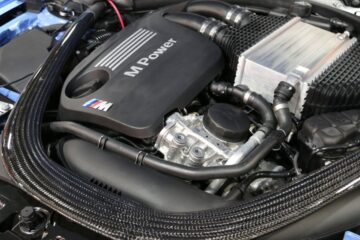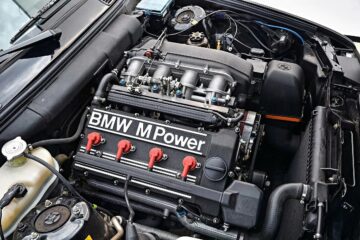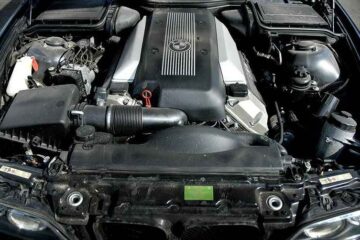BMW started production of the power unit in January 1983. More than 174 copies of the M21D24 were produced at the plant built in Steyer until mid-December 1992. This is the first power unit of the concern, which is diesel-powered and has 6 cylinders. It should be noted that this motor was created on the basis of the gasoline unit M20, which has a belt drive.
Let’s consider the technical characteristics of the M21B24 unit installed on the BMW E30/E28
M21D24 engine specifications
| Power, hp. | 115 |
| Fuel type | Diesel fuel |
| Volume, cm*3 | 2443 |
| Maximum torque, N*m (kg*m) at rpm. | 210 (21) / 2400; 220 (22) / 2400 |
| Engine type | In-line, 6-cylinder |
| Cylinder diameter, mm | 80 |
| Number of valves per cylinder | 2 |
| Maximum power, hp (kW) at rpm. | 115 (85) / 4800 |
| Blower | Turbine |
| Compression ratio | 22 |
| Piston stroke, mm | 81 |
| Fuel consumption, l/100 km | 7.3 |
| CO2 emission, g/km | 165 |
Advantages
The engine cylinder block is monolithic, made of cast iron and has a 30-degree tilt to the right, which is characteristic of most engines of the German manufacturer. However, its head is made of aluminum with the location of the camshaft at the top. The fuel pumps for the installation are VE, supplied by Bosch. On BMW cars, an electronic block ME is used to control the motor. Its task is to form signals to change the volume of diesel fuel supplied. The fuel injector regulator, by changing the position of the plunger spool, simultaneously regulates the injection process.
A potentiometer links it to the ME unit. The amount of diesel fuel depends on the crankshaft, its speed, the temperature value of the coolant, the position of the accelerator pedal, the intake air/fuel, the speed of the car, the boost pressure. The sensors transmit all this data to the system. Having received the necessary information, the ME-block optimally calculates the fuel supply for different operating modes of the power unit: starting, warming up, rpm control, etc. The system performs damping of the car. The system performs autorotation damping if the driver sharply presses the gas pedal.
Innovative self-diagnostics ensures reliable control of the powertrain. If malfunctions are observed in the engine components, the self-diagnostic system starts to utilize spare parts to ensure optimum performance of the powertrain. All fault information is recorded in the system’s memory using a scanner.
Disadvantages
According to feedback from most car owners, the main engine problems are:
- Overheating. If the cooling system of the M21D24 is defective, the cylinder head will heat up quickly. Check the condition of the pump, radiator, thermostat and air plugs in the system;
- Unable to start the machine. Cause – the unit controlling the plugs has failed. Repair or replacement is required;
- Sensitivity of the plant to ultra-high temperatures;
- The oil pressure gauge is illuminated, indicating loss. The main cause is a defective oil cooler connection hose;
- Deafening noise at idle speed. There were blows on the cylinder, more precisely, on its piston;
- Engaging the starter. The ignition switch is stuck;
- M21D24 oil pump leaks. Reasons – it has failed or similar fate has befallen the torque converter in the gearbox.
Modifications
The M21D24 engine has three modifications. Two units appeared in 1983. The power of both motors was 114 “horses”, but they had different torque, respectively, 210/220 Nm. Two years later, the Germans created a third version of the power plant. It had a power of 84 “horses”, and the torque was 152 Nm.
Chip tuning
The end result of engine chip tuning will be an increase in power, torque, improved performance and reduced fuel consumption. Another question is whether it is worth doing it? Most likely, it will be more profitable to buy a newer motor than to chip an old motor with many problems.



0 Comments